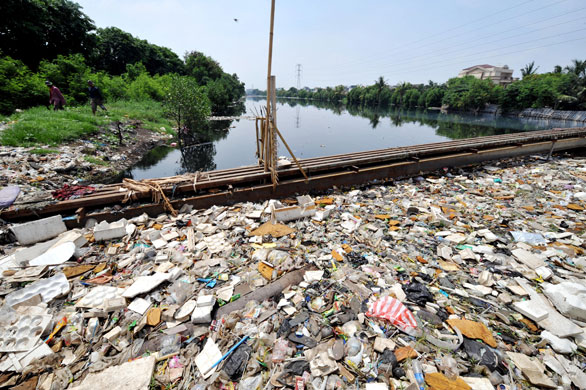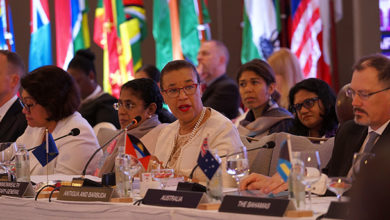
A week ago, I was in a vehicle from Achimota to Lapaz and right in the heart of Lapaz, there was a heap of rubbish in the middle of the N1 or George Walker Bush Highway. In between the inner lane and the outer lane of the road which was designed to serve as a pedestrian walk way for road crossers, the rubbish was being piled up by workers wearing old Zoomlion overalls. One of passenger in the vehicle commented, “The ‘borla’ car will come for it later in the day. That is what they do every day, they pile the rubbish up in the middle of the road for the vehicle to collect them some time later in the day.”
Two days later after witnessing this, I went to the Kaneshie market and what I saw got me disgusted. The entrance to the Kaneshie market complex has been turned into a refuse dump. A mountain of rubbish could be seen in front of the market complex and the stench from the rubbish was simply sickening. But what irked me the most was that, the Kaneshie Police Station is located just adjacent the entrance to the market. Thus if the law enforcement agency in this country is overseeing such buffoonery, just close to its doorstep, then the least said the better.
Again, opposite the market is a trotro and taxi station where station masters take money from drivers on a daily basis, and one wonders what that money is being used for. Because obviously, it’s not for maintaining the station and its environs. One of the country’s reputable banks is located right at the entrance of the market on the ground floor where the rubbish is piled up, also, another state owned bank is located on the first floor of the market complex. On the same floor, there is the office of the Accra Markets Company Limited, and one wonders if it’s just because these institutions don’t care about the health and wellbeing of their workers and more so their customers, or because it has become an accepted norm in Ghana that we are just a filthy nation, so we are not bothered about filth.
The same scenario is repeated across most of the major markets in the country, and city authorities are to be held complicit in this matter. This is because they are the ones who usually sanction it. One early morning, I saw a woman who was probably aged between 40 and 50 years wearing a Zoomlion overall with the inscription YEA (the irony right! Jobs meant for the youth being done by people beyond the age requirement to be classified youth. That is not the drift of this article however, so we will talk about this issue hopefully later) standing close to a heap of rubbish at a bus stop around Darkmuan, I queried her on why they dump the rubbish there and she said they are not the ones who dump the refuse there, but instead the sweepers of the AMA who dump the refuse there. I am sure if I had met one of the sweepers
of the AMA there instead of her, they would have also blamed the AMA sweepers.
From the foregoing, I can’t help but agree with Pastor Mensah Otabil that “Accra is not a dirty city, the people in it are”. The renowned preacher in a sermon stated according to Ghanaweb that, “The ground never produces rubbish or bottles … Accra is not dirty, it’s the persons living in it that are dirty, Accra can’t be dirty on its own”. Because if such institutions and renowned bodies can sit aloof and watch as their staff report to work each day to be greeted by such filth without taking any measures then it leaves much to be desired.
In 2015, the Daily Graphic, Ghana’s leading newspaper reported that, according to the WHO and the United Nations Children’s Fund, Accra is the 7th dirtiest city in the world. This statistic is a damning assessment on the country and steps must be taken to quickly roll this epidemic back.
The solutions to these sanitation problems are not as difficult as rocket science. There are international best practice in dealing with sanitation problems which we can easily learn from and adopt. From all of the places I mentioned above, the main challenge has to do with rubbish collection and the lack of rubbish containers. The companies contracted by the various assemblies (in this case the AMA) should ensure the timely collection of the rubbish that they create. Again these assemblies should as a matter of urgency provide rubbish containers and replace them at least every six months. My observation for some time now has been that, when these containers are provided, they take a very long time to be replaced sometimes up to four years or more. This means whatever mechanism we hope to use in solving our sanitation problems becomes unsustainable.
My greatest fear in the time being however is that, we are gradually approaching the rainy season yet again and if measures are not taken to solve our sanitation problems we risk the outbreak of cholera or even worse another June 3 disaster.
My final words are that, in spite of all the measures we take, there is a need for a cultural and attitudinal change if we are to see progress in dealing with sanitation problems. We cannot fold our arms and hope
the government comes up with a genius plan to solve our sanitation issues. If we keep on littering our streets and our markets, then no matter the money we invest in sanitation, there will be little or no results.
The Author Albert Opare is a political science graduate from the University of Ghana and a social commentator as well as a social & political activist.
By Albert Opare







